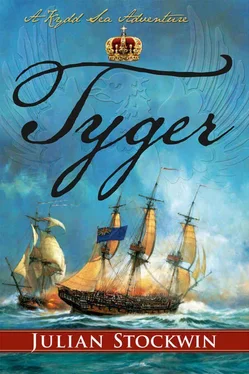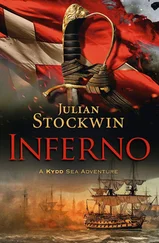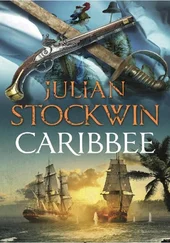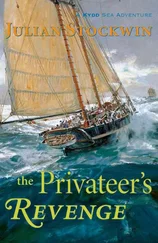The narrative ran on: it was the “unaccountable desire of the naval commander to cross the Atlantic without orders on a brazen attempt to invade South America, which notwithstanding that the capital Buenos Aires had actually been captured in no way excused the action, still less the consequent shipping back of millions in silver bullion.”
The piece pointed out that the adventure had failed, with the ignominious surrender of the British forces to the rag-tag Spanish colonial forces, which was greatly to be regretted. Then, in ponderous, elliptical prose, it scouted the rumours that the entire venture had been for the personal profit of this distinguished officer.
Kydd threw the paper aside. The author had not even mentioned the immense strategic advantage of detaching Spain from her colonies and their sustaining wealth-if successful, it would almost certainly have thrown her out of the war.
The Hampshire Register took a different and more sympathetic tack, wondering if the entire affair was the work of Popham’s enemies, seeking to destroy his reputation. The undoubted benefit to British commerce of opening up the Plate river trade in hides and grain and as a market for industrial goods, it claimed, was never going to be recognised by stiff-necked Tories intent on bringing down Popham.
That was the daily newspapers. The radical Cobbett in his Annual Register had ranted against the expedition as having “originated in a spirit of rapacity and plunder” and even questioned whether Popham “had ever been placed in a situation to have had a single shot fired at him.” There had been pamphlets too, some making direct accusations of avarice and corruption and others of sordid dealings in India.
What was it about Popham that roused such emotions? Kydd shook his head and decided to take a stroll in the warm evening air.
There were many about, some no doubt on their way to Governor’s Green to an open-air meeting on the trial he’d seen posted up, so he shaped course towards the seafront with its view of the fleet at Spithead.
He hadn’t gone far when he heard a cry and saw a figure hurrying towards him. It was his former second lieutenant.
“Good day to you, Mr Bowden. What brings you here?”
“The trial in course, Sir Thomas. As I have a certain interest and … and I find myself at leisure at the moment,” he added.
They began to walk together.
“Your own presence I gather, sir, is rather more than a passing curiosity?”
“I’m summoned as witness. A sad business.” Then Kydd said offhandedly, “Look, if you’ve nothing better, shall you wish to sup with me? The George is famous for its lamb cutlets, as I remember.” They dined together in a quiet corner, the young man respectful and attentive.
But Kydd needed someone to whom he could speak in confidence. It was the inevitable consequence of the sea service: at any time the odds were that his friends and fellow captains were away in their ships, scattered over the globe in the vast oceanic arena that was now modern war.
“You knew Commodore Popham well,” prompted Bowden.
“As far as any man can penetrate his character,” Kydd replied. “A vastly intelligent fellow-you remember Fulton and his submarine boats, his inventing of the telegraph code we used at Trafalgar, the catamaran torpedoes, his raising of the Sea Fencibles-he’s a fellow of the Royal Society and knows more about conjunct operations than any man alive.”
“Conjunct?”
“Where the navy and army join to effect some blow against the enemy that neither may achieve on their own. He was with the Duke of York in Flanders, and that successful destruction of the sluice gates at Ostend in ’ninety-eight? It was his plan, not to mention his transport of Indian soldiers across the Red Sea to take the French in the rear when we were hard-pressed in Alexandria.”
“Then why …?” began Bowden, carefully.
“I can’t answer that. I’ve got along with him well enough but I can see how his superior ways could upset some of the blue-bloods. He’s a genius for making enemies-and friends, for that matter.”
“So the charge is leaving station, sir.”
“A very severe one, young fellow. If the Admiralty thinks you to be in one place, and makes plans to use your fleet in that belief, then finds too late you’re off somewhere else, can you blame them for feeling peeved?”
“Our talk in the gun-room was that he had secret intelligence he was acting upon. Did you believe him, sir, or should I not be asking this of you?”
“No, you should not, but I’ll tell you, as it has to come out in the trial. He told me at the time, without any evidence about him, that he was in thick with the prime minister and others and that they’d together devised a plan of attack on South America and that this was interrupted by Trafalgar. This means that the whole thing against Buenos Aires could have been an official move, not his own idea.”
“Ah. I see that the only way he can prove this is to call the prime minister as witness, but he’s-”
“Quite. Pitt dying is a big blow to his story. That is, if it wasn’t all a bit of a stretcher from the beginning.”
“Sir, can I ask you a personal question, as bears on the trial?”
“You can-but I’m not bound to answer it.”
“Sir, can you tell me why you fell in with his proposal to quit station?”
“I … I judged it more in keeping with a naval officer’s duty to do something in a rush of events than sit idle waiting for orders. I conceived that there was an opportunity of strategical significance that, if missed, would be a betrayal of the higher cause.”
“Sir, there were those in L’Aurore who observed you close to him, even as his special confederate in the whole matter. I hope you will excuse my plain speaking, but they might be forgiven for wondering why you are not standing next to him at the trial.”
“Do you think I should be?” Kydd asked.
“No, sir,” Bowden said. “You showed loyalty to your superior as so you should. And, besides,” he added, with a twist of a smile, “were you not following orders, as you must?”
“You’ll go far in the service, young whipper-snapper.”
“Then may I know what position you’ll take in court?” Bowden persisted.
“Position? There’s only one possible, as you should know.”
“Oh?”
“I tell the whole truth.” Kydd paused, then said with a slow smile, “That is, I answer every question put to me, neither more nor less than the matter being asked. If certain questions are not put, then …”
“And if they require to know whether you believe Commodore Popham was right to-”
“That is a matter of opinion, not evidence, and has no place in a court-martial,” Kydd barked.
He had thought hard about his position and this was the only one he could square with his conscience. On the one hand he felt sympathy with what the man had been trying to achieve in the larger picture, but on the other he did not want to be seen in the ranks of those trying to tear him down.
Yet there was still one niggling concern: might he eventually find himself accused of being an accomplice and arraigned?
In the morning, at eight precisely, a single gun thudded out from Gladiator and a Union flag mounted to her masthead.
The court-martial of a senior officer of the Royal Navy in what some were calling the trial of the age was beginning with the summoning of the court.
The majority were admirals and, as was the custom, mere captains took boat first from the man-o’-war steps. There was a sizeable crowd to see them go, held back by redcoats from the garrison, and an excited buzz rose. Kydd was in his full-dress uniform, his star and crimson sash marking him out as one of the sea-heroes so talked about, and he gravely acknowledged the cheers.
Читать дальше









